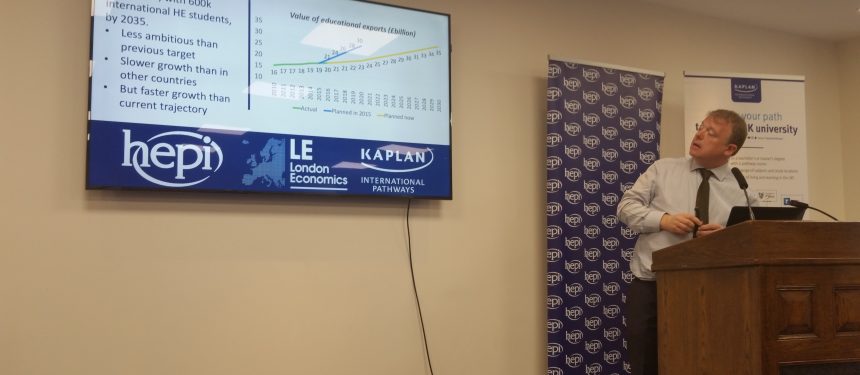A new report has revealed that international students who stay in the UK to work after graduating from UK higher education institutions pay £3.2 billion in tax – and they aren’t taking jobs from UK citizens.
News and business analysis for Professionals in International Education
Have some pie!
Post-study work restrictions cost the UK £150 million a year
 Director of HEPI Nick Hillman outlining the findings of the research Photo: The PIE News
Director of HEPI Nick Hillman outlining the findings of the research Photo: The PIE News Published by The Higher Education Policy Institute and Kaplan International Pathways, it also revealed the UK’s limitations on post-study work cost the treasury £150 million each year in foregone receipts, amounting to just over £1bn since the restrictions were introduced in 2012.
“Just one cohort of international students who stay in the UK to work contribute over £3bn”
“Graduates from other EU countries who stay here to work contribute £1.2bn and graduates from the rest of the world contribute £2bn,” the research carried out by London Economics explained.
“This is made up of over £1bn in income tax, over £700 million in employees’ National Insurance Contributions, over £800m in employers’ National Insurance Contributions; and nearly £600m in extra VAT payments.”
The analysis additionally shows international graduates who find employment in the UK typically do so in sectors that suffer from acute skills shortages.
“Rather than displacing domestic graduates, international graduates are plugging skills shortages,” the analysis read.
Speaking about the report, director of HEPI Nick Hillman said UK universities firmly believe the government’s biggest mistake in higher education has been to discourage international students from coming to the country.
“It is a testament to the strengths of our higher education sector that the number of international students has not fallen, but it is an absolute tragedy that we have been unable to keep up with the pace of growth in other countries,” he said.
Hillman added that the Home Office used to say there is “insufficient evidence to show international students bring benefits to the UK”.
“We proved this to be false last year when we showed international students contribute £20 billion a year net to the UK. But, afterwards, the Migration Advisory Committee claimed there was still a lack of evidence to show international students who stay in the UK to work make a positive contribution,” Hillman continued.
“We can now disprove this too. Just one cohort of international students who stay in the UK to work contribute over £3 billion to the UK Exchequer… and it would be even more if policymakers had not reduced post-study work rights in 2012.”
Senior vice president at Kaplan Linda Cowan added that there is currently a real risk to the UK of losing the significant economic, educational and soft power benefits it has enjoyed for many years.
“We now have evidence that one of the many ways international students contribute to our economy is by filling skills shortages. Given their high level of English competency and impressive academic achievements, we should be doing everything possible to encourage them to stay and work here,” she said.
Cowan said it was very encouraging to see the inclusion of growth targets in the government’s new International Education Strategy, and the emphasis placed on cross-governmental and sector cooperation.
“But we think the release of the report would have been even stronger if it had been released in the name of the Home Office as well as the Department for Education and the Department for Trade,” she told The PIE News.
MillionPlus said it welcomed the HEPI/Kaplan report, with chief executive Greg Walker adding that it should serve as a further incentive for the government to drive forward the International Education Strategy.
“A competitive post-study work offer is not only good for attracting students but, as this report highlights, it will boost the UK economy as well. These figures show what more could be gained if we get it right,” said Walker.
“Rather than displacing domestic graduates, international graduates are plugging skills shortages”
“This report…underscores the need for a clear change in approach, helping the UK to become more competitive by removing unnecessary barriers to educating more international students.”
Chief executive of Universities UK Alistair Jarvis said the UK’s immigration system should reflect the value of international students’ contribution.
“[International students] contribute economically… culturally by enriching the educational environment in our universities [and] play a vital role in combating skills shortages in key sectors including science, engineering and nursing careers,” he said.
“They want to come and study in the UK, seeing the value of the high-quality education our universities offer, but we are slipping behind our global competitors – Australia, New Zealand and Canada.
He said that while the new International Education Strategy marks a step in the right direction, more should be done to send a welcoming message to international students.
“The government should extend the opportunities for graduates to work in the UK to at least two years,” Jarvis added.
Still looking? Find by category:



Very good data and article, I think the UK Govt. should really look into figures and give International student same 2 years Post Study work rights -good for student, good for UK economy.